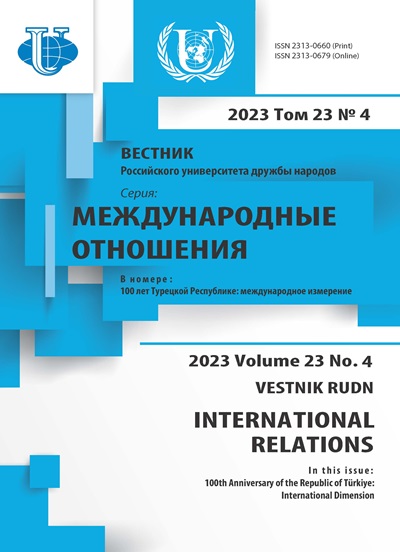Türkiye’s Black Sea Policy for Energy Security
- 作者: Celikpala M.1, Tatlioglu E.2
-
隶属关系:
- Kadir Has University
- RUDN University
- 期: 卷 23, 编号 4 (2023): 100th Anniversary of the Republic of Türkiye: International Dimension
- 页面: 748-761
- 栏目: 国际经济关系
- URL: https://journals.rudn.ru/international-relations/article/view/37260
- DOI: https://doi.org/10.22363/2313-0660-2023-23-4-748-761
- EDN: https://elibrary.ru/PRLYMK
如何引用文章
详细
Türkiye’s foreign policy has recently taken on a more autonomous trajectory, less directly tied to European Union (EU) or NATO policies. Notably, the Black Sea region stands out as an area where Türkiye has charted an independent and distinctive course. The Black Sea region’s growing importance underscores the need to define Türkiye’s policy that contributes to stability in the region. Recent conflicts involving Russia, Ukraine, and Georgia, as well as the interest of non-regional actors, have heightened the region’s security concerns and energy security risks. Understanding Türkiye’s role in this context is essential for international relations scholars, policymakers, and practitioners. After the dissolution of the Soviet Union in 1991, the Cold War environment of military competition was replaced by an environment of cooperation and collaboration in the Black Sea region, combining political, economic, and cultural goals. However, the emerging conflicts between some littorals, such as Russia and Georgia in 2008 and Russia and Ukraine in 2014 and 2022, have caused a change in the perception of security and stability of the region. Thus, the interest of external actors in the Black Sea has increased and their attempts have begun to demonstrate a greater presence in the region. This has induced circumstances that increase the risk of conflict in the region and threaten energy security. Furthermore, the region has attracted the interest of non-littoral states, which has led to new challenges. In light of these developments, the authors seek to provide an objective examination of Türkiye’s Black Sea policy, emphasizing its growing significance within the region’s evolving dynamics and energy security concerns. In addition, the main pillars of Türkiye’s Black Sea policy under the principle of regional ownership will be discussed.
作者简介
Mitat Celikpala
Kadir Has University
Email: mitat@khas.edu.tr
ORCID iD: 0000-0003-3773-6145
PhD (International Relations), Professor, Dean, Faculty of Economics, Administrative and Social Sciences
Istanbul, TürkiyeErman Tatlioglu
RUDN University
编辑信件的主要联系方式.
Email: ermantatlioglu@gmail.com
ORCID iD: 0000-0001-9745-2043
PhD Student, Department of Theory and History of International Relations
Moscow, Russian Federation参考
- Avatkov, V. A., & Gudev, P. A. (2021). Geopolitics of Russian-Turkish relations in the Black Sea Region. RUDN Journal of Political Science, 23(3), 348-363. https://doi.org/10.22363/2313-1438-2021-23-3-348-363
- Ayvazyan, D. S. (2020). Limits of Turkey’s capabilities as a transit gas corridor. Contemporary Europe, (7), 79-88. (In Russian). http://dx.doi.org/10.15211/soveurope720208392
- Bakan, S., & Güven, M.E. (2021). Karadeniz Ekonomik İşbirliği Örgütü (KEİ) örneğinde bölgesel işbirliği örgütlerinin etkileri ve Akdeniz üzerine değerlendirme. Kahramanmaraş Sütçü İmam Üniversitesi Sosyal Bilimler Dergisi, 18(1), 528-557. https://doi.org/10.33437/ksusbd.835867
- Balta, E. (2019). From geopolitical competition to strategic partnership: Turkey and Russia after the Cold War. Uluslararası İlişkiler Dergisi, 16(63), 69-86. https://dx.doi.org/10.33458/uidergisi.621309
- Çomak, H., Sancaktar, C., Tatar, V., & Şeker, B. Ş. (Eds.). (2017). Karadeniz jeopolitiği. İstanbul: Beta Basım Yayım Dağıtım A.Ş.
- Elmas, B. (2018). Türkiye’nin Gürcistan politikasindaki değişim ve dönüşüm. Uluslararası Sosyal Araştırmalar Dergisi, 11(59), 344-351. http://dx.doi.org/10.17719/jisr.2018.2642
- Erbaş, G. D. (2012). Jeopolitik kavraminda değişim: Karadeniz jeopolitiği örneği. Çankõrõ Karatekin Üniversitesi Uluslararasõ Avrasya Strateji Dergisi, 1(1), 135-146.
- Erbaş, G. D. (2014). Enerjinin jeopolitiği: Karadeniz enerji-politiği örneği. Mersin Üniversitesi. Retrieved from http://apbs.mersin.edu.tr/files/goknil.erbas/Publications_001.pdf
- Erbaş, G. D. (2018). Karadeniz bölgesinde boru hatları jeopolitiği. Karadeniz Araştırmaları, (57), 17-31.
- Erkek, L. (2006). Karadeniz deniz güvenlik politikası [thesis]. Istanbul: İstanbul Üniversitesi.
- Eshba, E. D. (2013). Regional cooperation on the Black Sea: Achievements, problems, prospects. MGIMO Review of International Relations, (6), 42-48. (In Russian). https://doi.org/10.24833/2071-8160-2013-6-33-42-48
- Hodges, B., Horrell, S., & Kuz, I. (2022). Russia’s militarization of the Black Sea: Implications for the United States and NATO. Center for European Policy Analysis. Retrieved from https://cepa.org/comprehensive-reports/russias-militarization-of-the-black-sea-implications-for-the-united-states-and-nato/
- Irkhin, A. A., & Moskalenko, O. A. (2021). The Black Sea region in the contest of geopolitical projects of the great powers, 1991-2019. Vestnik RUDN. International Relations, 21(3), 498-516. (In Russian). https://doi.org/10.22363/2313-0660-2021-21-3-498-516
- Kasım, K. (2007). Türkiye’nin Karadeniz politikası: Temel parametreler ve stratejiler. Uluslararası Stratejik Araştırmalar Kurumu. OAKA Tartışma Platformu, 172-180. Retrieved from https://silo.tips/download/trkye-nn-karadenz-poltkasi-temel-parametreler-ve-stratejler
- Koçer, G. (2011). Karadeniz’in jeopolitiği ve güvenliği: Türkiye perspektifi. In E. Başar (Ed.), Uluslararası deniz hukukunda kıyı devletinin gemilere el koyma yetkisinin sınırları sempozyumu (pp. 27-38). Trabzon: ORSAM.
- Oktav, Ö. Z. (2022). Ukrayna savaşı’nın Türkiye - Rusya ilişkilerine olası etkileri: Fırsatlar ve krizler. Bilge Strategy, 13(23), 17-22.
- Sarı, Y., & Avcu, S. A. (Eds.). (2020). Russia, Central Asia, and the Caucasia. Eskişehir: Anadolu University.
- Shlykov, P. V. (2023). The state of strategic hedging: Turkey’s foreign policy and relations with Russia. Russia in Global Affairs, 21(3), 134-158. https://doi.org/10.31278/1810-6374-2023-21-3-134-158
- Sıvış, E. (2019). Bölgeselcilik kavramı işığında Karadeniz Bölgesi: Soğuk savaş sonrası dış politika dinamikleri. Ömer Halisdemir Üniversitesi İktisadi ve İdari Bilimler Fakültesi Dergisi, 12(4), 563-577. https://doi.org/10.25287/ohuiibf.570057
- Uçarol, R. (2015). Siyasi tarih (1789-2014). Istanbul: Der Yayınları.
- Urchenko, I. V. (2008). Geopolitical peculiarities of the Black Sea region in the context of the South Russia security ensuring. Vestnik RUDN. International Relations, (3), 18-24. (In Russian).
- Uslu, İ. (2019). Soğuk savaş sonrası Karadeniz Bölgesi’nde güvenlik ve işbirliğine yönelik politikalar [MA thesis]. Ankara: Ufuk Üniversitesi.
- Yiğit, S., & Gülbiten, G. (2017). Rusya’nin yakin çevre diş politikasi ve Azerbaycan. Barış Araştırmaları ve Çatışma Çözümleri Dergisi, 5(1), 54-70. https://doi.org/10.16954/yalovabaccd.329892








